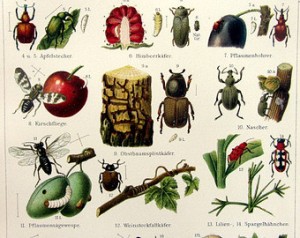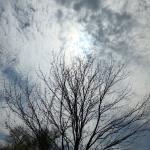 First came the vine borers. These are moths. The females lay their eggs inside the stalks of squash plants. When the eggs hatch, the larvae start to eat. They eat so greedily, the larvae can easily kill the entire plant.
First came the vine borers. These are moths. The females lay their eggs inside the stalks of squash plants. When the eggs hatch, the larvae start to eat. They eat so greedily, the larvae can easily kill the entire plant.
I learned that you must split the vines open where you see gunk building up on the outside of the vine. Then you stick in your finger until you feel a grub and pull the little wriggler right out.
After the vine borers came the cucumber beetles, of the family Chrysomelidae. We had two types: spotted and striped. With cucumber beetles, it is not the beetle so much as the bacteria they carry with them. Bacterial wilt makes all the plants in your garden look so very yellow and sad.
The kale was being ravaged by two kinds of caterpillars. One sort was lime-green in color; the other a striped, fast-growing, slightly fuzzy little sucker that replicated at a rate faster than my wife and I could keep up with or understand. The fuzzy crawlers seemed to generate spontaneously.
Finally, the Mexican bean beetle. Epilachna varivestis. These are formidable beetles, from spikey, orange larvae to ladybug-like mature beetle. They chew bean leaves into skeletal remnants, beautiful to behold but fatal to the plant. Watching Mexican bean beetles attack is like watching a garden fade slowly into a ghost world.
The biblical prophets were lamenters. They’d lament about the political situation in ancient Israel and Judah. Or they’d lament about the wicked ways of the wayward children of Moses. But sometimes, the prophets would lament the simple fact that life is hard and that nature is inexplicably cruel. Joel, one of the twelve minor prophets of the Hebrew Bible, was especially incensed about insects.
“That which the palmerworm hath left hath the locust eaten,” laments Joel in the King James translation. “And that which the locust hath left hath the cankerworm eaten; and that which the cankerworm hath left hath the caterpillar eaten.”
Indeed and amen.
“Blow ye the trumpet of Zion,” proclaims Joel in response to this apocalypse of insects, “and sound an alarm in my holy mountain: let all the inhabitants of the land tremble: for the day of the LORD cometh, for it is nigh at hand.”
I own a little commentary on the minor prophets Joel, Obadiah, Haggai, Zechariah, and Malachi, written by John J. Collins, a biblical scholar at Yale Divinity. The book fell into my hands when a man at my church died and his wife, not knowing what to do with it, gave the book to me.
Her husband had ordered Volume 17 of the New Collegeville Bible Commentary just before he died, and it arrived on her doorstep as a strange parcel that had improbably, troublingly crossed the boundary between life and death. I’m slightly scared of the book for that reason. I’ve invested it with powers.
Professor Collins makes two striking observations in his commentary on the Book of Joel. He writes, “Verse 11 makes clear that the invasion of the locusts and the coming of the Lord are the same event: the locusts are the army of the Lord, and he is at their head. No explanation is given as to why the Lord attacks his land in this violent way.”
Not surprising, since no explanation has ever been given for why the Lord attacks his land in this violent way.
The second observation is as follows: “It is remarkable, however, that [Joel] does not attribute the catastrophe to some sin of the people or call for repentance as a precondition of deliverance. It is enough that the people demonstrate their distress and call on the Lord.”
This morning, in our garden atop a small hill in semi-rural Pennsylvania, the ravages of the beetles and moths have died down. In this hour of deliverance, the truth suddenly seems clear.
There is a message coming from God by way of the insects, just like the Hebrew prophet Joel said. The insects do proclaim the day of the Lord, the apocalypse. But the apocalypse is every day. Every day there are signs and messages and every day creation is in the process of being created.
The locusts do not ravage the land for any particular reason. They just do. It is not a punishment. It is a fact. And the fact is an opportunity.
The locusts come and then we lament and demonstrate our distress and call on the Lord. And then the Lord says, “Be not afraid, ye beasts of the field: for the pastures of the wilderness do spring, for the tree beareth her fruit, the fig tree and the vine do yield their strength.… And I will restore to you the years that the locust hath eaten, the cankerworm, and the caterpillar, and the palmerworm, my great army which I sent among you.”
And he does restore all of it…until the locust, and the cankerworm, and the palmerworm, and the caterpillar come again on another day of the Lord, which could be tomorrow, or any day, really, for the Lord dwelleth in Zion and sends out his army whenever he pleaseth, so that we must drop what we are doing again, get on our knees, call out for help, demonstrate our distress, and be delivered, again and again, ad infinitum, at his whim—joyful and sad as we are, by turns, to be participants in the creating and obliterating storm.
Morgan Meis is the critic-at-large for The Smart Set (thesmartset.com). He has a PhD in Philosophy and has written for n+1, The Believer, Harper’s Magazine, and The Virginia Quarterly Review. He won the Whiting Award in 2013. Morgan is also an editor at 3 Quarks Daily, and a winner of a Creative Capital | Warhol Foundation Arts Writers grant. A book of Morgan’s selected essays can be found here. He can be reached at morganmeis@gmail.com.















